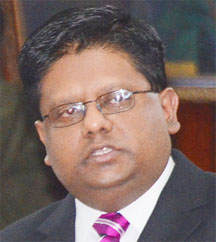Minister of Finance Dr. Ashni Singh yesterday assailed APNU’s reasons for not supporting the Amaila hydropower project, calling them factually wrong and saying that tariffs will come down 20 percent within two years of operation.
Singh also accused APNU of destroying the project. Amid the harsh rhetoric, Sithe Global, which walked away from the project on Friday over the lack of consensus yesterday said its position has not changed. This was relayed to Stabroek News by its President Brian Kubeck.
In a statement issued yesterday, Minister Singh said APNU’s assertion that Amaila will condemn Guyanese to excessive burdens of indebtedness is not true. He also debunked the main Opposition’s statements that it was not given enough documentation on the proposed US$858.2 million project.
Following Thursday’s passage of two key project measures in the National Assembly, Sithe Global announced its departure from the project stating that those measures were not unanimously supported in the House, what it called a necessary prerequisite for garnering international development financing for the project.

“No Government borrowing has taken place under the Amaila Falls project. Government is not taking out any debt or directly guaranteeing any capital in the project. Under the project, Government, as owner of GPL, is merely guaranteeing that GPL will make its annual payments for purchasing power from the hydro,” said Dr. Singh.
He explained that the total cost to the taxpayer is US$100 million in equity. “None of this is debt. US$15 million has already been spent and most of the remainder – US$80 million – is already deposited in the Guyana REDD+ Investment Fund and awaiting transfer,” he said.
He said that after Amaila is operational, the total savings to the taxpayer because of the removal of GPL’s subsidy will be at least US$30 million per year, or US$600 million over 20 years, “far in excess of the US$100 million provided by the taxpayer in equity.”
In response to APNU’s statements that Government has not provided concrete information on the expected savings on tariffs from the project, Dr. Singh said that over the coming years, the consumer tariffs will come down not only because of Amaila but also of the modernization of GPL.
“Today, GPL’s biggest cost by far is the cost of electricity generation, which is currently at the level of US19 cents per kw/h. with Amaila, GPL’s cost will be dramatically reduced to US11 cents per kw/h in the first 12 years, 40 percent less than today; US5.6 cents per kw/h in the next eight years, 71 percent less than today; and US1.8 cents per kw/h for the following 80 years, 91 percent less than today,” he said.
He said that the combination of savings and removal of GPL’s subsidy means that the end user tariff will come down 20 percent within the first two years of Amaila’s commercial operation.
The Minister’s revelation that the tariffs will come down by 20 percent in the first two years of operation is a departure from statements previously made by the President and Sithe Global itself. They were showcasing a reduction of 40 percent.
APNU has drawn a distinction between the cost of the power delivered to GPL by Amaila and the final cost to the consumer and noted that this distinction has not been made clear by Government.
With regards to the concern of APNU that it did not receive a comprehensive document describing the project, Dr. Singh said that Government has over the past 18 months made three presentations on the project, presented all three significant initialled project agreements: the Power Purchase Agreement; the Receivables Agreement and the Implementation Agreement.
He said that the main Opposition party also received two market/economic assessments prepared by one of the world’s leading independent firms concerned with economic assessments for the energy sector, Mercados Energeticos.
“In addition to the documents provided by the Government, the project sponsor, Sithe Global, has publicly posted a number of documents on the project’s website, including Environmental and Social Impact Assessment documentation, consultation reports and public presentations,” said the Minister. “Every single person in the country will suffer because of their mistake,” the Minister said in reference to APNU.









